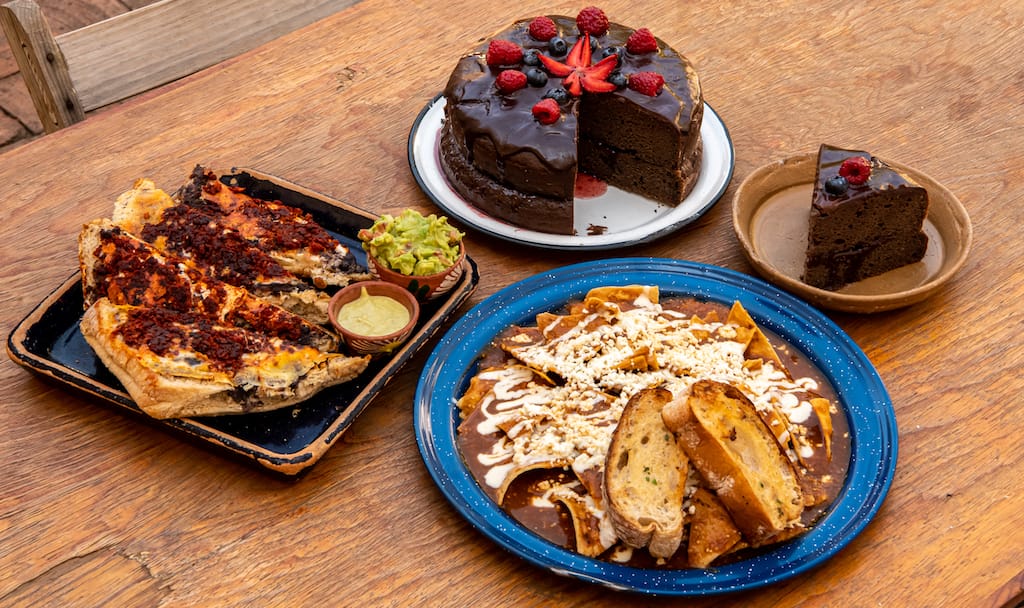Standing behind the smoke veil rising from the hot clay griddle, Thalía Barrios Garcia roasts dozens of tomatoes of all shades of red with the confidence of a woman who has her future in her own hands. At the early age of 26, Thalía is the owner and head cook of Levadura de Olla, one of Oaxaca City’s most exciting new restaurants.
Despite the pandemic – or maybe because of it – Levadura de Olla’s popularity has skyrocketed in the last few months, likely due to its healthy menu that is friendly to most dietary styles and, more importantly, because it is deeply rooted in the cooking styles of Thalía’s hometown: San Mateo Yucutindoo. A remote village located in the southern mountains of the state of Oaxaca, it is a place where the semi-desert landscapes of the valley, an incipient forest and semi-tropical flora collide, creating one of the state’s most off-the-beaten path regions, both culinary and geographically speaking. The name Levadura de Olla – literally “claypot yeast” – comes from the ferment used in San Mateo to bake bread in clay pots.

From our very first visit, the intricate yet simple flavors of Thalía’s dishes transported us to the hidden households of the Oaxacan mountains, where the smokiness present in the salsas and beans mixes with the earthy mushrooms, the wild herbal-ness of the quelites (native greens) and the sweetness of freshly made tortillas. Without a doubt, her food mirrors the cooking and life of the women of her family, who are mostly responsible for her daring views. “I was born a woman, and in San Mateo that means that you must learn how to cook and be prepared for all that being a woman implies. But my story starts before me, with all the women of my family. Most of them were single mothers, so they also learned how to do all the things that men do, like working on the fields and farming,” Thalía says. Her knowledge of agriculture and its cycles is the thread guiding her restaurant’s menu.
Although Levadura de Olla is not all about vegetables, they are the star of most of the dishes; when present, the meat gets second place. “In general, due to its location and lack of refrigerators, meat is not abundant in San Mateo and, in my case, vegetables were the backbone of my [paternal] grandmother’s cooking. She had small children and didn’t have a husband who would go hunting for a rabbit or other animals. Later, when my mother married my father, she was deeply influenced by this style, although meat was present in some dishes of her family’s recipes – so I also grew up with that,” Thalía says.
Levadura has echoes of the southern mountains and other villages that Thalía has brought with her. These come through not only in the dishes…they are also present in something more abstract. We can sense it in the seasoning and her cooking techniques, which revolve around spiciness (not pungency or hotness) and smoke.
As we ate our way through the menu, we could both hear and taste the young cook’s past and present. We found sweet potato, one of the ingredients that she learned to love and use thanks to her grandmother, as the filling inside Levadura’s plump and moist tamales.

Thalía’s passion for food started when her grandmother taught her how to make tamales, and later when she took a workshop in her village to learn how to bake cakes and cook black mole (which is a very atypical dish in her hometown due to the price of chocolate and seeds, considered ingredients only used for Day of the Dead and other special celebrations). Her occasional trips to the city, however, gave her the final motivation to pursue her career – the sight of the Central de Abastos, its activity and the exuberant food on offer awoke the entrepreneur cook in her. “I started a birthday cake baking business in San Mateo, as cakes are not common up there for birthdays. Every time I came to the city, I used to buy baked goods catalogues. I would hang the cake pictures above my stove and try to replicate their height and colors so I could give people some extra joy on their special day,” she says.
While Thalía literally brought sweetness to her hometown, she also brings delight and special ingredients and flavors to Levadura’s costumers, such as edible flowers and purple tomatoes from her hometown. The restaurant’s impressive offer of traditional beverages is one of its unique qualities. There is no other place in Oaxaca City – and probably the rest of Mexico – where we could find such an ample variety of the ancestral beverages brewed and prepared across the state. This includes drinks like ticunchi, a fermented coral-colored beverage made with the juice of papalometl agave and a plant called trebol, native to the southern mountains bordering the coastal region.

Levadura has echoes of the southern mountains and other villages that Thalía has brought with her. These come through not only in the dishes – such as a taco of aired cheese (a fresh cheese left outdoors to dry, resulting in an aged flavor and unusual texture) with flor the pipe (a succulent edible flower that is sautéed with tomatoes and a subtle chile paste) – they are also present in something more abstract. We can sense it in the seasoning and her cooking techniques, which revolve around spiciness (not pungency or hotness) and smoke.
After succeeding at baking cakes, Thalía decided to come to the city to study gastronomy. “At first, I was very confident. I knew all about corn nixtamalization and preparing moles, what could go wrong? But I was very shocked when I realized I knew nothing about French (and European) cooking, which is the core of the whole career – but I did learn,” she says. After a few years, Thalía graduated as a chef trained in European techniques, which deepened her respect for Mexican cooking. “At first, I was having second thoughts about my simple tamales, as my colleagues were preparing things like sous vide meat or hollandaise sauce. But then I realized, Mexican food is unique because it is less standardized than European food. Both are difficult, but Mexican food is more complex, as it is about being alert with all your senses. Think of nixtamal, you cannot follow one single recipe – it all depends on the type of corn. You must bite the grain, smell it, get to know it before cooking it,” she explains.

The deep understanding of ingredients at Levadura de Olla is only one of its many gifts. Its proposal of a “non-hierarchical menu” is another. “All the dishes have the same importance. We separate them with other categories that have nothing to do with the typical progression of ‘entrée, main course,’ etcetera. A soup or a salad is just as important as a meat dish. Everything is sacred, everything is food,” Thalía reflects. The best example is the signature native tomato dish with beetroot puree and cinnamon vinaigrette. The sometimes tart, sometimes sweet, always fresh flavors of this powerful dish are so deep and so unexpected that you forget the need for a “main course” containing meat.
Thalia’s goal to give vegetables a renewed position in an industry focused on spotlighting animal-based proteins is also present in her desire to restore the roles of the longtime ignored protagonists of the industry’s – and households’ – kitchens: women. “I am not against men. I just would like women to reclaim a place we’ve ironically lost. Therefore, I would like Levadura to be a project where women are the heart and the hands behind it,” she states. While Thalía’s tone is relaxed and unpretentious, her driven nature is just as refreshing as the tomatoes dish we just had. It melted our hearts – and many paradigms as well – in a good way.
 April 11, 2024 Oscuro Brebaje
April 11, 2024 Oscuro Brebaje
As difficult as the last two years have been for food businesses, it has offered many […] Posted in Oaxaca August 20, 2021 El Posito
August 20, 2021 El Posito
Back in our college days, in the mid 2000s in Mexico City, we spent hours talking with […] Posted in Oaxaca July 22, 2022 El Tendajón Agavería: Something For Everyone
July 22, 2022 El Tendajón Agavería: Something For Everyone
In Oaxaca, when friends come together to eat after a long night out, sitting down for […] Posted in Oaxaca
María ÍtakaJalil Olmedo
Published on April 18, 2022
Related stories
April 11, 2024
OaxacaAs difficult as the last two years have been for food businesses, it has offered many establishments an opportunity to rethink how they do things and come back with a greater sense of purpose. Take the example of Oaxaca’s Oscuro Brebaje, a café that took a pause, only to emerge stronger and more inviting. Founded…
August 20, 2021
OaxacaBack in our college days, in the mid 2000s in Mexico City, we spent hours talking with our fellow students about the foods we missed the most from home. When we, the “Oaxacan delegation,” brought up piedrazos, everyone in the room laughed. They could not fathom something with such a name – piedrazo literally means…
July 22, 2022
OaxacaIn Oaxaca, when friends come together to eat after a long night out, sitting down for brunch becomes a challenge – everyone has different cravings and dietary needs. In the heart of the city center, there is a place with something for everyone: Tendajón Agavería. The all-day eatery is a true standout among the numerous…






















































































